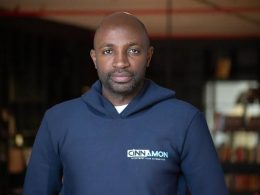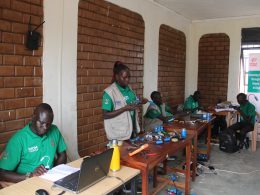By Mark Kawalya
Malaria and farmers’ loss of income due to spoilt milk are two ever-present problems for Ugandans. Jovia Kisaakye, a university student studying statistics, Makerere recognized the impact of these issues and developed a singular solution to both problems. The silver bullet is in the form of mosquito repellant developed using sour milk.
According to the National Dairy Development Agency (DDA), Ugandan farmers have an annual milk production capacity of more than 2.8 billion liters. However, since most of them live in rural areas with no access to electricity, they are unable to refrigerate their milk, making spoilage inevitable.
Similarly, World Health Organization figures put the number of Ugandans that contract malaria each year at 14 million. The disease is the number one cause of death in the country, with tens of thousands of people hospitalized each year because of the tropical disease.
A Life-Changing Family Tragedy
Jovia Kisaakye can be best defined as someone who is driven by finding solutions to everyday problems. The 20-year-old business statistics student admits that she is something of a restless soul, always searching and prodding processes, wondering if there is a better method of achieving similar or better results.
Her journey of discovery started with a tragedy that befell her family when she was younger. Her parents were livestock farmers in the small town of Lukaya, and her family wholly depended on cattle for their daily sustenance. With the cattle requiring a continual supply of drinking water, the family dug trenches which were used as rainwater reservoirs for the animals. While this was a workaround to the issue of the thirsty animals, it presented yet another problem. The trenches became the perfect breeding ground for mosquitoes. As a result, the family suffered bouts of malaria, with Kisaakye often missing school due to infection from the disease.
However, things were about to take a turn for the worse. Tragedy struck when her younger brother, Jeremiah, contracted malaria and soon passed away from the disease. The family moved away from cattle keeping, which Kisaakye took in with relief because she associated her brother’s demise with cattle rearing.
The Search for Answers
She also questioned if cattle rearing could be carried out on a better model after seeing large quantities of milk going to waste after her family failed to sell it off. This was due to the lack of electricity and access to refrigeration facilities to preserve the milk.
She struggled with feelings of hopelessness as she watched her mother look for alternative means of feeding the family after failing to sell the milk that would go bad.
“The death of my brother was so painful that I don’t like revisiting it,” Kisaakye says. She often asked herself if there was something, she could do to find a solution that would placate her family’s tragedy but also be used on a wider scale to save more lives from malaria, especially those of children.
On the other hand, her family’s life of hardship despite rearing cattle drove her to seek a way of improving the fortunes of farmers who lacked a method of preserving their milk.
A Crucial Chance Meeting
Jovia’s ideas began moving from idea to practical stage when she joined high school.
“When I finally joined Chichende High School and began taking up regular agricultural projects, my desire to use sour milk for useful products grew stronger,” Kisaakye says.
As she developed a better understanding of the problem, her desire to use this information to create a solution grew. She was placed in charge of agricultural projects, where she met two university students, Brasio Kawere and Patrick Sseremba who were carrying out a project at her high school.
The duo became her business partners later on. After completing her A-levels, Kisaakye joined Makerere University in 2019, where she met Kawere and Sseremba. Kawere left Makerere with a degree in dental surgery, while Sseremba works at Mulago National Referral Hospital as a medical doctor.
According to Sseremba, he was impressed with Kisaakye’s drive and ambition, which made him come to the decision to work with her. “Jovia is an ambitious young girl. Unlike many girls her age who expect parents to sustain them, she wasn’t one. She had millions of ideas in her head, and I thought of joining her in the journey. She loves her work and always points me to new opportunities that I can go for,” he says.
A Prototype that Still Needed Work
After a battery of rigorous research, the team of three found a method of making a lotion from sour milk that could repel mosquitoes. By 2019 and after some trials, they had come up with a prototype that they called Sparkle mosquito repellant milk lotion. They were the recipients of a $1,500 grant from Makerere University’s Incubation Center to invest in the initiative with the guidance of professors and lab staff.
In 2020, the team market tested the product to determine its efficacy and rate its user acceptability. A year later, the team was looking for a way to further develop their prototype. They combined a mixture of mosquito repellant plant extracts with sour milk, but the result still needed work. “We made a few unstable products at first. Our lotion was 100% effective at repelling mosquitoes but unstable on the shelf, so we had to revise the ingredients,” says Kisaakye. “The team carried out more tests on the product and hit a benchmark of 80% effectiveness at repelling mosquitoes along with stability on the shelf.”
Penetrating Markets Outside Uganda
With additional funding for product development and assistance from chemists, their sour milk mosquito repellant was given certification by the Uganda National Drug Authority as safe for human use. “Our products, which are marketed through our firm, Sparkle Agrobrand Limited, have been accepted and are now available in Uganda, Kenya, Nigeria and Benin. We are keen to expand and grow our market across Africa and beyond,” says Kisaakye.
40% of the sour milk the business uses comes directly from farmers who sell each liter at shs700, the same price they would ordinarily sell fresh milk at, giving them a cushion from losses. The other 60% is procured from factories and wholesalers who have a surplus.
Patrick Sseremba, Jovia’s business partner, says that the business, which is situated in Kajjansi, is currently worth $500,000.
Sparkle Agrobrand recently entered into a partnership with Jumia, Africa’s leading e-commerce platform, which has enabled the firm to enter markets beyond Uganda. Currently, the firm is piloting a new product which is fertilizer produced from sour milk, and also has plans to set up a production plant that will be used to produce more products made from waste.








